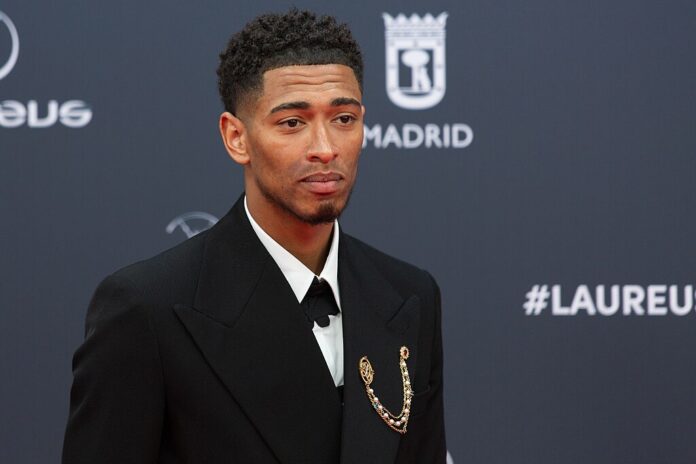Bellingham and five Arsenal players make the shortlist, marking a shift in football’s elite as Lionel Messi and Cristiano Ronaldo are absent for the first time since 2003.
In a dramatic turn for football’s most prestigious individual award, the 2024 Ballon d’Or shortlist has been revealed without Lionel Messi and Cristiano Ronaldo, marking the first time in two decades neither of the football giants has been nominated. Instead, the spotlight is firmly on a new generation of talent, including six English players led by Real Madrid’s Jude Bellingham.
Bellingham, 21, has had a meteoric rise, becoming one of the hottest properties in world football. His nomination follows a stellar season with Real Madrid, where he was pivotal in their La Liga and Champions League successes. Moreover, his role in guiding England to the final of Euro 2024 only solidifies his claim to the award. If successful, Bellingham would become only the fourth Englishman to win the Ballon d’Or and the first since Michael Owen in 2001.
Joining Bellingham on the shortlist are fellow English players Harry Kane, Phil Foden, Cole Palmer, Bukayo Saka, and Declan Rice. Arsenal, in particular, can boast five nominees, including key stars like Saka, Rice, Martin Odegaard, and William Saliba, reflecting the club’s resurgence under manager Mikel Arteta.
A notable addition to the list is Aston Villa’s Emiliano Martinez, who also makes a strong case for retaining his Yashin Trophy for the best goalkeeper. Manchester City, the reigning Premier League champions, also dominate the shortlist with nominees including Erling Haaland, Rodri, and Ruben Dias.
Bellingham’s teammate, Vinicius Jr, has emerged as the odds-on favourite for the Ballon d’Or. The Brazilian winger was instrumental in Real Madrid’s European Cup victory, scoring crucial goals, including a standout performance in the Champions League semi-final against Bayern Munich and sealing the final victory over Borussia Dortmund.
Meanwhile, in the women’s category, Barcelona and Spain players dominate the shortlist. Last year’s winner, Aitana Bonmati, leads the pack, alongside other stars like Lucy Bronze and Lauren Hemp from the Lionesses squad. The Women’s Ballon d’Or continues to grow in prominence, with the winner set to be announced at the Paris ceremony on October 28.
Analysis
Political
The absence of Cristiano Ronaldo and Lionel Messi from the 2024 Ballon d’Or shortlist signifies the end of an era in football. For years, the two players have dominated the political landscape of football, shaping the sport both on and off the field. Their exclusion this year not only reflects their career trajectories but also marks a symbolic shift in football power. The new wave of players like Jude Bellingham and Vinicius Jr is not just challenging the old guard but also redefining the political balance within the sport, with a focus on younger talent emerging from countries like Spain, Brazil, and England. This transition impacts international football’s leadership dynamics, as new stars step into the limelight and potentially influence political decisions in the game, including contract negotiations, sponsorships, and the overall direction of football governance.
Social
Socially, this year’s Ballon d’Or shortlist reflects broader shifts in football culture. With stars like Bellingham, Haaland, and Saka becoming role models for younger generations, the focus is moving from individual accolades to teamwork, humility, and inclusivity. The spotlight on Arsenal players, in particular, highlights the club’s growing influence in fostering young talent, creating a new social narrative around how football clubs can contribute to shaping future stars. The rise of female players, especially with the Women’s Ballon d’Or, reinforces how football is becoming more inclusive and gender-diverse, breaking down barriers that previously limited the growth of women’s football. The presence of players from various backgrounds also shows how the sport continues to embrace diversity, making football a universal platform for cultural exchange and representation.
Racial
Racial diversity is also at the forefront of this year’s nominations. Players like Vinicius Jr, Bukayo Saka, and Jude Bellingham highlight the growing representation of Black athletes at the highest level of the sport. Their achievements challenge stereotypes and prove that talent transcends race and background. The nomination of African players like Khadija Shaw in the Women’s Ballon d’Or further underlines the inclusivity of the sport. This shift in representation not only showcases football as a global game but also emphasizes the importance of embracing racial diversity in sports. As football becomes more diverse, it strengthens its position as a tool for breaking down racial barriers and fostering unity across different communities.
Gender
The continued recognition of female footballers in the Ballon d’Or nominations shows significant progress in gender equality within the sport. Players like Aitana Bonmati, Lucy Bronze, and Lauren Hemp are not just competing at the highest levels—they are also setting new standards for excellence in women’s football. The increased visibility of women’s football through awards like the Women’s Ballon d’Or pushes the conversation on gender equality forward, giving female athletes the recognition they deserve. While the men’s Ballon d’Or remains the more celebrated award, the growing prestige of the women’s version indicates a positive shift in societal perceptions of women’s roles in sports, breaking traditional gender norms and creating equal opportunities for both men and women.
Economical
Economically, the nominations reflect football’s deep ties with global commerce and marketability. Players like Jude Bellingham and Erling Haaland have massive commercial appeal, influencing the football economy beyond the pitch. Their nominations drive sponsorship deals, merchandising, and media rights, which contribute significantly to the financial landscape of football. Clubs like Real Madrid, Manchester City, and Arsenal, whose players dominate the shortlist, are among the wealthiest and most commercially successful teams in the world. This economic clout allows them to attract top talent and reinforces their position in the sport’s elite, creating a cycle of financial dominance. In the women’s game, the increased recognition through the Women’s Ballon d’Or nominations opens up new avenues for investment and commercial opportunities, gradually bridging the financial gap between men’s and women’s football.
